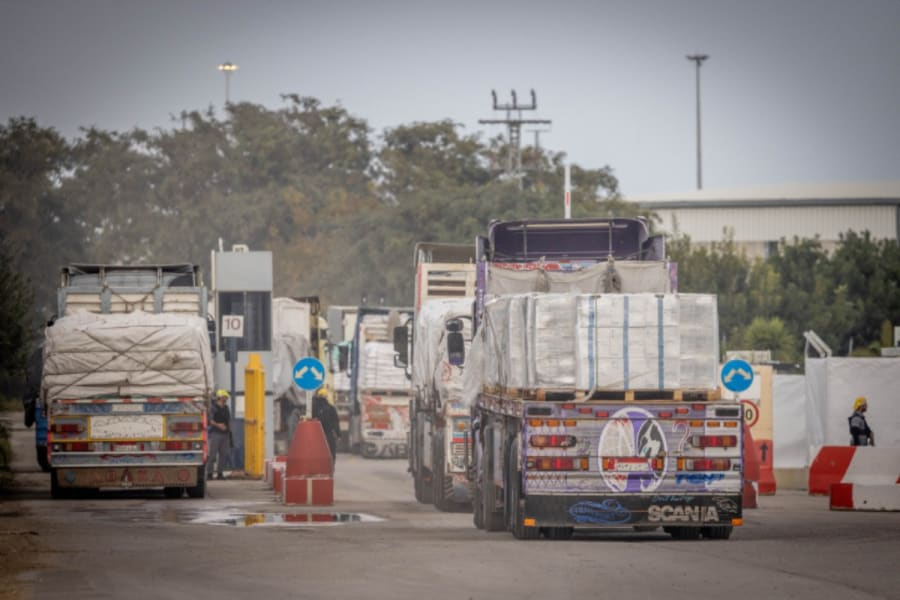Israeli report: Despite claims of famine, food aid to Gaza is sufficient; looting still problematic
Study finds inadequate distribution by aid agencies significantly contributes to food insecurity

The chief prosecutor of the International Criminal Court (ICC) is seeking arrest warrants for Prime Minister Benjamin Netanyahu and Defense Minister Yoav Gallant, citing severe food shortages and insecurity in Gaza. The prosecutor alleges that these conditions are part of a deliberate strategy by the Israeli government.
Now, according to a new study undergoing peer review in the Israel Journal of Health Policy Research, the amount of food aid going into Gaza is more than sufficient for the basic needs of the entire population.
At the beginning of April, several humanitarian organizations petitioned the High Court of Justice claiming aid agencies in Gaza were experiencing severe difficulties in distributing food aid to the Gaza Strip, particularly in northern Gaza. The High Court gave the Israeli government six days to respond and address the issue of sufficient food aid entering the embattled enclave.
In its response, the government told the court that while it acknowledged the problems with food insecurity in the Gaza Strip, it has not set any limits on the amount of food entering through the crossings. The IDF's Coordinator of Government Activities in the Territories (COGAT) claimed it was conducting inspections of between 350-400 aid trucks per day across the southern Kerem Shalom border crossing, and would be increasing its inspections and deliveries to northern Gaza, as well.
The government also claimed it only rejected 1.5% of distribution requests., however, several aid organizations argued that government rejection of distribution requests compromised their ability to deliver aid within the Gaza Strip. COGAT also reported that aid organizations had requested a reduction in the amount of aid being delivered due to problems with distribution.
The government listed two prominent challenges regarding the delivery of aid: distribution within the Gaza Strip, which is carried out by the humanitarian agencies, and the confiscation or looting of aid by the Hamas terror group.
At that time, the state also authorized the opening of a new crossing into the northern Gaza Strip, as well as the renovation of the damaged Erez crossing, which was attacked by Hamas on Oct. 7.
According to this new study, authored by a group of experts from the Israeli Ministry of Health, along with leading Israeli universities, such as Hebrew University, Tel Aviv University, and Haifa University, the amount of food aid being delivered into the Gaza Strip was “significantly greater” during the period between January and April than it was before the Gaza War.
The study found that the mean energy availability across those four months was 3,163 calories (kcal) per person, per day, significantly higher than the accepted standard of 2,100 calories per day in a humanitarian crisis situation.
“This in-depth analysis highlights the fact that the amount of food delivered per capita should be sufficient for the entire Gazan population, and meets Sphere humanitarian recommendations for food aid delivery to conflict-affected populations, during the period examined,” the study said.
The study also found that only 54% of aid pallets transferred into the Gaza Strip were being delivered by the United Nations and other aid organizations, apparently supporting Israel’s claim that the lack of distribution is the more significant problem.
While the World Food Programme (WFP)has been warning of a “full-blown famine” for some time, based on a study in March by the Integrated Food Security Phase Classification (IPC) organization, the IPC study found no evidence for non-trauma mortality related to food insecurity.
Even the Hamas-run Gaza Health Ministry claimed 31 deaths from malnutrition since the start of the war in a March 15 report.
Recently, aid delivered to Gaza via the U.S.-built temporary pier was also looted by armed individuals assumed to be from Hamas, who confiscated almost 70% of the aid before it could be delivered to the WFP.

The All Israel News Staff is a team of journalists in Israel.
You might also like to read this:














